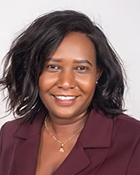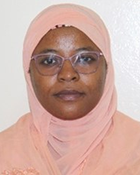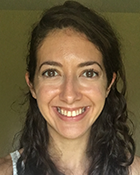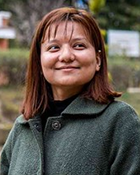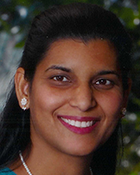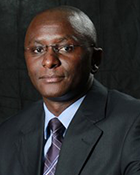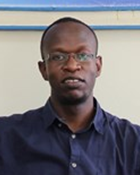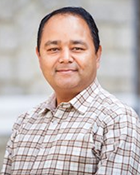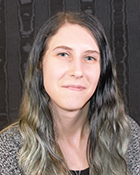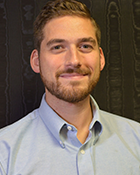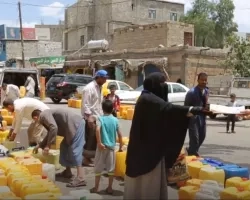This summer, two NASA Center directors met with the Women in SERVIR working group: Jody Singer, of Marshall Space Flight Center in Huntsville, Alabama, and Dr. Marla E. Pérez-Davis, of the John H. Glenn Research Center in Cleveland, Ohio. Women in SERVIR—an internal discussion series focused on gender and inclusion—brings the network together to learn, share, and discuss topics at the intersection of gender and geospatial science. On the call, Singer provided introductory remarks followed by Pérez-Davis, who presented on her professional journey, current work at NASA, and how the agency is working towards a more equitable and inclusive workplace for all.
The presence of two NASA Center directors made a deep impact. Below are some of the topics raised by the guest speakers—and reflections from SERVIR colleagues around the world.
ON REPRESENTATION:
"Dr. Pérez-Davis’s personal experience from how she started her experiences, her commitment to her family, her journey generally was very inspiring. It’s a story I would wish to hear again. It was an eye opener on the recognition of contributions of women in science. The importance of inclusivity based on diversity and equity, the talk on not being too hard on ourselves, not being our own worst critics was encouraging.”
Lucy ChepkocheiCapacity Development Lead, SERVIR Eastern & Southern Africa (Nairobi, Kenya)
“The story of Dr. Marla Pérez-Davis reminds me of a woman I am very proud of: the first scientist from Niger to join NASA [in the United States, at Goddard Space Flight Center]. At 29 years old and holding a PhD in hydrology, Dr. Fadji Zaouna Maïna joined the American space agency on August 27, 2020—a success that makes her a model for Nigerien youth, and especially for young girls. This is what resonated in my mind.”
Dr. Jamilatou Chaibou BegouWater and Capacity Building Lead, SERVIR-West Africa (Niamey, Niger)
ON LEADERSHIP:
“As someone just beginning her graduate program/foray into scientific research, seeing women represented in such high-level positions itself was really empowering. It's not often that I even work with female professors or post-docs, let alone women of such rank; though it sounds cliche, it made me feel that if my female colleagues or I put our minds to it, we could make great advances too.”
Katelyn TarrioSERVIR-West Africa Applied Sciences Team Co-Investigator (Boston University, Boston, MA)
“It was indeed a massive energy boost when this ‘lockdown and virus’ situation had almost drained all the ambitions I had. I also dream to become an inspiring person in the days to come. I, for a moment, envisioned myself being a leader like [Drs. Singer and Pérez-Davis] in the future–really felt good. I felt stronger and more determined to do better in the coming days. Whenever I feel low, I will always remember them.”
Tanuja ShresthaGeospatial Associate — Data Science, SERVIR Hindu Kush-Himalaya (Kathmandu, Nepal)
“The presentation by Dr. Pérez-Davis on her professional journey was inspiring. As one of the few women in leadership positions, Dr. Pérez-Davis is a strong role model for STEM women worldwide—across all sectors. It was particularly impressive how she is so committed to this responsibility and continues to encourage the next generation. In a true NASA spirit, she showed how women can achieve their dreams through persistence and resilience!”
Dr. Jasmeet JudgeSERVIR West Africa Applied Sciences Team Principal Investigator (University of Florida, Gainesville, FL)
ON MENTORSHIP:
“For me, it was the power of a mentor—from early in life throughout one's career and life. I recall the example where Dr. Pérez-Davis’s mother stopped her and other siblings from playing, just to watch the first man landing on the moon. The mother said something like, 'kids, stop and watch this, this is big', and the daughter ended up years later working for NASA ... We all have those memorable moments in our lives when we need someone to say ... stop, watch that, it could grow into something big!”
Dr. Robinson MugoProject Manager & Chief of Party, SERVIR Eastern & Southern Africa (Nairobi, Kenya)
“I appreciated Dr. Perez-Davis's comments on mentorship: how she leads her peers/mentees by asking questions rather than lecturing, making them feel valued and included. This is something I hope to put into practice with the students I work with and others in the future.”
Katelyn TarrioSERVIR-West Africa Applied Sciences Team Co-Investigator (Boston University, Boston, MA)
“I was personally touched by Dr. Pérez-Davis’s words on mentorship: 'People get to their own answers when you ask them questions.' This taught me a lot and I am grateful.”
Kenneth KaseraUser Engagement Lead, SERVIR Eastern & Southern Africa (Nairobi, Kenya)
ON PROFESSIONAL DRIVE:
“Many things Jody and Marla told resonated with me because by nature, I am also someone who takes/has taken challenging research decisions/career paths in life and have never stepped back on ‘taking a chance’. Previously, I conducted permafrost research in the mountains of Nepal to which I was suggested not to do by many folks. But I took the chance, remained positive, and, because of that, I was able to get the Chevening Scholarship in the United Kingdom that helped me upgrade my computing skills with a degree in High Performance and Scientific Computing from Swansea University. Now, I am working as a data science associate–still a challenging area for a person who has a background in environmental science. And I am doing well. By this job, I have been 100% outside of my comfort zone that helped me gain a huge confidence and strength. This experience has taught me to fail daily yet keep on trying for better results.”
Tanuja ShresthaGeospatial Associate — Data Science, SERVIR Hindu Kush-Himalaya (Kathmandu, Nepal)
“Dr. Pérez-Davis is an amazing woman—she never gave up the social life, raised two high-caliber children, and is still professionally very active and talking about landing of first woman in moon, developing next generation of astronauts to work in Mars and showing the vision to the world on how the aerospace industry can achieve net zero carbon emissions by 2060! I learned a lot. I am motivated to continue my passion in empowering women in GIT in the HKH region.”
Dr. Rajesh Bahadur ThapaCapacity Building Lead, SERVIR Hindu Kush-Himalaya (Kathmandu, Nepal)
ON THE WORKPLACE:
“I’m still at the beginning of my career, but it gave me a lot to think about with what path I want to take. It also made me think about the SERVIR program in general, and how glad I am to be working somewhere that I do have so many female role models to look to and that gender and social inclusion are considered in so many aspects here.”
Sara MillerEastern & Southern Africa Regional Science Associate, Science Coordination Office (Huntsville, AL)
“One thing that I thought was quite prescient was Jody Singer’s comment, ‘Know your own recipe [for success].’ I thought that was a great distilled life lesson, because it speaks to each person individually. Understanding how you thrive and working to promote those climates is a fantastic way to excel and reach your full potential as an individual.”
Tim MayerHindu Kush Himalaya Regional Science Coordination Lead, Science Coordination Office (Huntsville, AL)
“The statement that resonated the most was ‘do not be so hard on yourself’. In Japan, I used to say to my colleagues ‘work smarter, not necessarily harder.’”
Dr. Rajesh Bahadur ThapaCapacity Building Lead, SERVIR Hindu Kush-Himalaya (Kathmandu, Nepal)
Women in SERVIR, a discussion series open to all genders, was established in 2018 in response to an outpouring of interest to discuss the role of gender in SERVIR’s work. It has since grown to discuss new approaches (such as the ICIMOD intersectionality framework for understanding differential gendered vulnerabilities), learn about cutting-edge research (like IUCN’s work investigating the triple nexus of gender inequality, state fragility, and climate change), and give space for colleagues to share stories about inspirational women and mentors.

